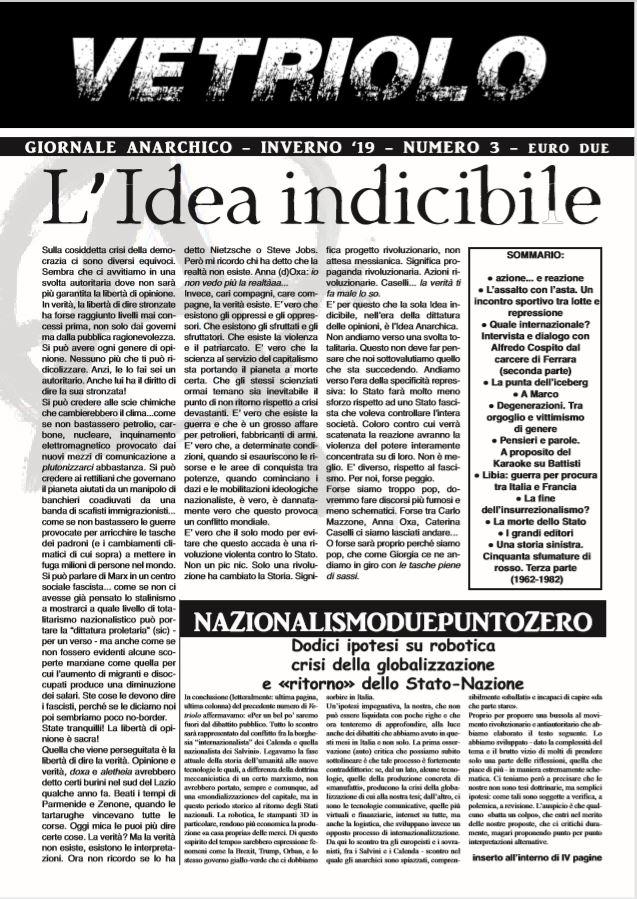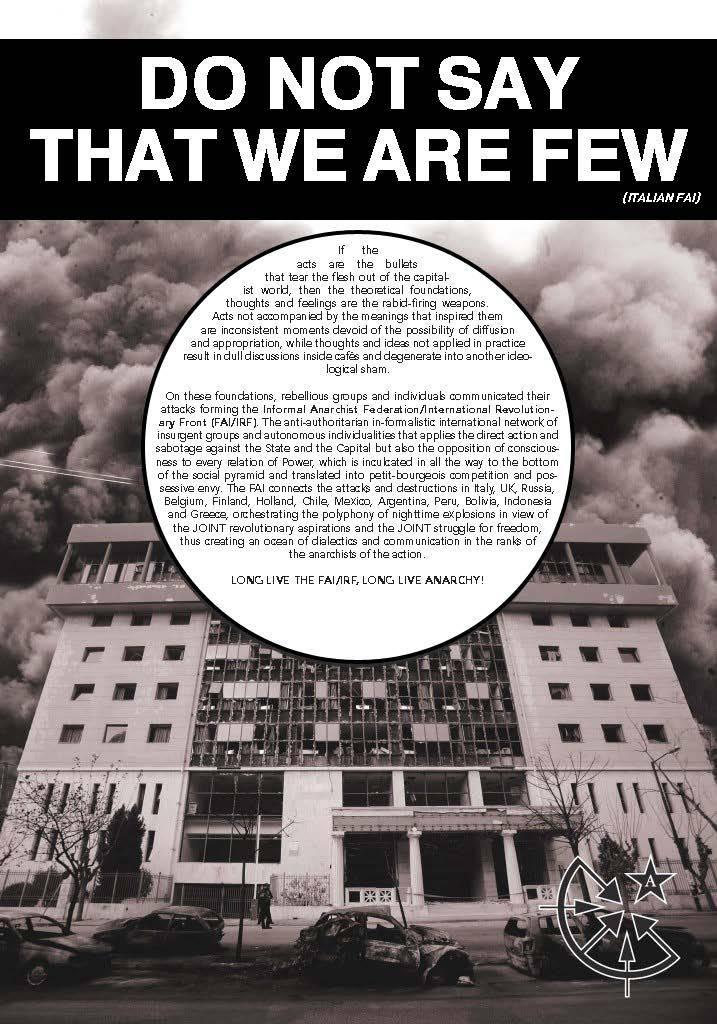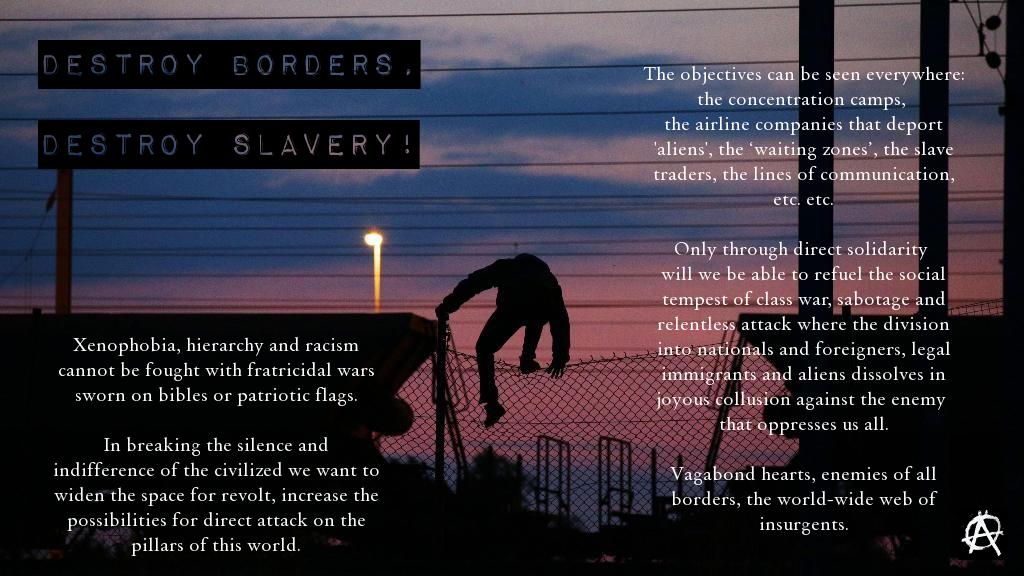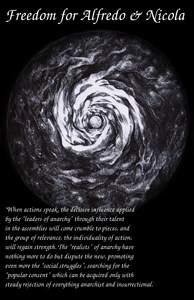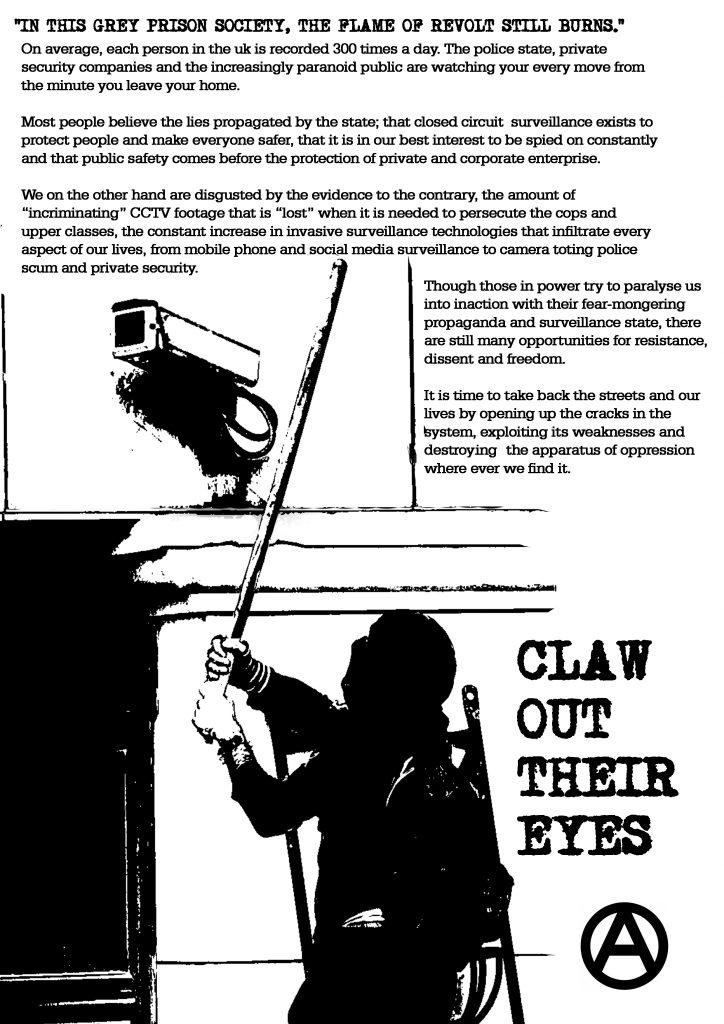Misanthropic Wild Tendencies
Other expressions of authoritarianism and sacred thought

Given the recent proliferation of eco-extremism and some opinions expressed in the broadcast media related to this tendency, the need arises for this text. Without pretending to engage in a dialogue, we will clarify a few things that seem essential to us.
For several years now, various individuals from different parts of the American continent (especially from the territory dominated by the Mexican State) close to the positions and struggles against civilization, gave shape to a trend that they called “eco-extremism”.
What is eco-extremism? Although there are subtle differences between those who are placed under that concept, we can more or less talk about a consensus among them, since they see the whole of humanity as their enemy; that humanity and it’s civilization is incompatible with Wild Nature.
They understand that the war against civilization is indiscriminate, so any person would represent an enemy. Since humanity is the problem, anyone can be the target, regardless of gender, economic condition, age, etc. The forms of attack of these groups are inspired by the most diverse experiences, so they do not mind picking up the “teachings”[1] of religious fanatics such as ISIS or political parties that wager for national liberation, as their indiscriminate methods serve them.
One of the most emblematic action groups of this current is “Individuals Tending towards the Wild” (ITS). In 2011, several technological research centers began to be attacked with explosives in some Mexican cities. Over the years, the attacks continued and at the same time several related groups appeared, all of them having civilization as their common objective. In 2014, “Reacción Salvaje” (RS) appears, concentrating several eco-extremist groups and leaving aside the initials ITS. For 2016, ITS returns with the main objective of expanding the project to new locations. That same year from the Territories dominated by the Chilean, Argentine and Brazilian States arise attacks and claims related to ITS. There are also organizations sympathetic to this trend, ranging from an individualist perspective to anti-civilization, such as the Egoist Sects in Italy, and organisations have emerged related to eco-extremism in Germany, France, Finland, etc.
To achieve its objectives, which is the end of civilized humanity, there have been all kinds of attacks ranging from the abandonment of explosive devices on public roads during the day to fire, letters bombs and some murders.
In addition, they believe that every natural phenomenon that hurts humans in their lives and properties is akin to their principles of ending civilization, as for what they have claimed in their pages of internet tidal waves, earthquakes, snowfalls, etc.
Between aesthetic radicalism and the sacred
The eco-extremists call themselves individualistic and nihilistic, many of them come from anarchism and, according to their own words, approached anarchism seeking “salvation” and “free community” but only saw “a set of Christian moralists”, and so they chose to move towards something “more radical”. This search for “radicalism”, we understand it more as the appropriation of everything that is seen as “politically incorrect”, according to the parameters of what the citizenry collects. In this way, if tomorrow there is a new concept that bothers or disturbs the “normal human” beings, no doubt, they will appropriate it. Radicality is to finish with the root of the problem, not just going towards the extreme or provocative.
They have cemented their theoretical foundations in the study of some nomadic hunter-gatherer peoples; according to their own words, they have rescued pagan animism, however they have created a new faith based on different ancestral deities. Their sacred polytheistic thoughts are perhaps not as violent as the Christian God, but it is one (or some) All Powerful, after all…
We find it curious that they call themselves individualists and nihilists, being that they believe in entities that are above them, how can the individual be developed integrally if their reality is subject to something that controls them? We appeal and we fight to destroy all the chains, creeds and laws.
“We are and will be enemies of any religion, be it Christianity, animistic paganism or Wild Nature. No static doctrine is above us. Let us free ourselves from all that is sacred, we have neither faith nor law and our discourse will have neither.” — Max Stirner
We see in their writings how they try to be masters of the Truth and how they sacralize their war against civilization into a kind of neo-inquisition against everything that, for them, is not correct or against everything that represents “civilized” values. By validating their position as “the only possible reality” they are necessarily above the rest, setting the standard of “good and bad”. Their evident authoritarian positions are closely linked to the absolutism of feeling possessed of a certain wisdom and of believing themselves to be the elect for the naturalistic Crusade.
“The sacred is then the highest of the essences and everything by which it is revealed or manifests itself, also sacred are those who recognize that supreme in their own being, that is, in its manifestations. What is sacred sanctifies in turn its worshiper, who by their worship makes it sacred; and in the same way sanctifies all that it does: holy commerce, holy thoughts, holy aspirations, holy actions, etc…” — Max Stirner
On opportunistic criticism
As is good to affirm, we are different things, so we are not interested in criticizing their work, much less falling into the easy exit of insult. The questions that they ask of anarchism do not affect us, since we do not share the way they see it; as a doctrine with patterns of rigid and immovable behavior. We understand it and we live it as a set of anti-authoritarian ideas and practices that confront all forms of domination. It is a constant tension not an achievement or an ideology. It is the destruction of everything that makes us enslaved, building new ways of relating between all the beings that inhabit this world and others with the Earth.
When the anarchists are criticized for having a moral as if we were religious or owners of the Truth, we clearly say that we reject morality, understanding this as the institutionalization of certain patterns and behaviors that are immovable, that is, when it becomes a “just because” and not a learning based on the experience of what is beneficial to us. We prefer the terminology of ethics, which comes from ethos or custom, not referring to a tradition but to experience, to what is habitual. We are not ingenuous or conformist, we know that within anarchism there is a wide range of tendencies and that, among these, there are opposing tendencies. There are those who see anarchism as a dogma taking the postulates of some comrades of other times as if they were sacred writings. In this way, we think, individual freedom is restricted within its organizational forms. Criticisms to these forms of thought and the differences in what refers to the action exist since there are anarchists who took the wholeness of the individual and/or took a qualitative and radical leap in the forms of attack. The criticisms made by some eco-extremists about certain forms of anarchism are not new… There are some of us who have been doing it for several decades (not to say more than a century). We do not expect a day for the revolution, nor the legitimacy of the masses, and we do not have a uniform pattern of behavior to follow.
Our option is to destroy all authority
As we explained earlier, many of the eco-extremists come from the anarchic world, specifically from the eco-anarchist and primitivist struggle, so it is logical that there may be many things that we share, but there are many other fundamentals that put us on opposite sides. We could expand on several but we will specifically address the vision of authority. In a text that we find in their digital media entitled “Anarchist Myth” they point out:
“We understand that authority and hierarchical organization are neither “good” nor “bad” but are something that simply exist, like it or not, it’s something very natural in human behavior since forever. Therefore we can be false and fall into the hypocrisy of anarchists and “Anti-authoritarians” or we can accept the reality and use it for what suits us.”
However, curiously, in the same text they call themselves individualists who do not “bow their heads in front of anyone” and that “they do not need to be told what they have to think, do or what decisions to make “. This dichotomy that unites hierarchy and individual freedom expressed by the author or authors, seems profoundly contradictory. Our idea of individualism has part of the basis of placing the individual at the center of all actions, that is, it is not above the collective nor below it, nothing submits it. We are completely contradictory to the position of the eco-extremists, we are enemies of all forms of authority and we do not see hierarchy as something “very natural” in human organizations. To make it clear; Anarchy comes from the Greek prefix “an” which means “without” or “no” and from the root “arkê” that translates into “power” or “mandate”.
We understand that in order for power relations to be generated, there basically has to exist some kind of mandate and obedience, which can be coercive or not, but it does not stop at violence. To support their “natural hierarchy”, they usually analyze various behaviors of some hunter-gatherer peoples.
We will do the same. As stated by Pierre Clastres in “The Society against the State”, when studying the different behaviors of several tribes of the Southern Cone (yes, leaving aside the great civilizations of the Incas and Mayas), he says:
“A pertinent feature of the political organization of most indigenous societies is the lack of social stratification and authority of power: some of them, such as the Ona and Yagan[2] of Tierra del Fuego, do not even possess the institution of leadership; it is said of the Jíbaros[3] that their language has no term to designate the chief.”
Almost all the writings that are known about the behavior of many American native peoples are from evangelizing priests, European conquerors and contemporary researchers. The first and second came from lands where there were great kingdoms, so they knew perfectly well what obedience is, and subsequent studies reaffirmed the above.
Clastres explains it clearly; “However, the direct experience in the field, the investigators’ monographs and the oldest chronicles, leave no doubt about this: if there is something completely alien to an indigenous, it is the idea of giving an order or having to obey it, except in very special circumstances, such as the expedition of war.”
We look, analyze and learn from different peoples, but we are clear that we do not want to be like them and even from our western vision (which we try to destroy) there are many things that we find hard to understand. We want to end domination, and in that exercise we build new ways of relating, we create new dynamics and we do not we want those of others, be they parties, vanguards or indigenous people.
The most certain thing is that with what we’ve written we will labeled anthropocentric hyper-civilized Christians; We may be, it’s not our intent to try to give lessons to anyone, but we simply want to make things clear. We do not want to leave their shadows of this world, we want to destroy each of the links of this great chain that makes us all slaves, among them too we include civilization, since we are aware of the damage it does to everything that surrounds it, but with this we do not believe that the solution is misanthropy and sacralization of nature, in fact, we believe that it is part of the problem.
>From Kalinov Most #1
[1] We have found several articles referred as, according to the eco-extremists, “what can be learned from different groups for the war against civilization”, they mainly talk about collecting experiences, forms of attack, etc. To name a few examples is the article in the magazine Ajejema entitled “Paraguayan People’s Army” (EPP). Can you learn from them?, in which they point out: “Valuable things can be learned from both the left and the right armed groups, and we have no moral problem in admitting it because more than once we have claimed a marked tendency towards anti-politics and what anti-ideological”. And another in Extinction magazine n° 6 called “The lessons left by the Islamic State before its collapse”, in which they point out: “The war of the Islamic state is an authentic war against civilization, although, surely if they triumphed they would impose their Islamic civilization with an iron fist, it’s a war anyway, so personally, I have no moral problem in learning from it.” In the forms of attack the eco-extremists collect from ISIS, among other things, the use of hens, donkeys and even children with Down’s syndrome attached to bombs.
[2] Ona and Yagan, towns that resided in Tierra del Fuego. The Onas or Selknam are extinct, the last Yagan woman was killed in the year of 2006.
[3] Los Jíbaros is a derogatory name for the Shuar people, they are the most numerous Amazonian natives (approximately 80,000 individuals). The Shuar inhabit the jungles of Peru and Ecuador.


